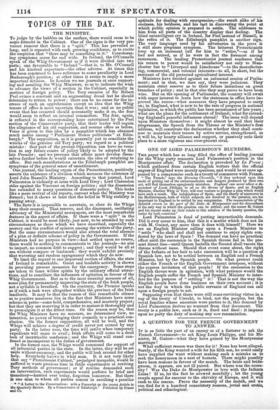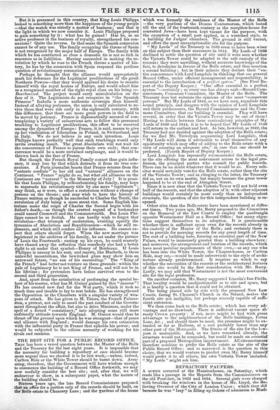A QUESTION FOR THE FRENCH GOVERNMENT TO ANSWER.
IT is as little the part of an enemy as of a flatterer to ask the French Government—to ask King Louis Philippe, and his Mi. mater, M. Guizot—what they have gained by the Montpensier marriage ? What sufficient reason was there for it? None has been alleged. Surely, if the King wanted a wife for his fifth son, he could easily have supplied the want without making such a mistake as to seek the honeymoon in a nest of hornets. There might possibly have been reasons in favour of the match. The bride and bride• groom, it appears, are not ill paired. But where was the neces- sity ? Was the Duke de Montpensier in love with the Infanta Luisa? If so, let the fact be avowed manfully ; let the young couple appeal for succour to the chivalry of Europe, and it will rush to the rescue. Prove the necessity of the match, and we Can find for it a hundred consolatory reasons, jovial and erotic, political and ethnological.
But it is presumed in this country, that King Louis Philippe looked to something more than the happiness of the young people —that the match was strictly a matter of business ; and that is the light in which we now consider it. Louis Philippe proposed to gam something by it : what has he gained ? Has he, as an active professor in the business of royalty, strengthened Lis con- nexions? Quite the reverse. In that sense the Spanish connexion cannot be of any use. The family occupying the throne of Spain is not recognized by the major half of Europe. The family with which he has contracted so close a domestic tie is not so rich in resources as in liabilities. Having succeeded in making the re- volution by which he rose to the French throne a matter of his- tory, he has by the connexion with Spain reopened the perilous question of revolutionary coronations. Perhaps he thought that the alliance would appropriately mark his deference for the Legitimist predilections of the great Northern Powers—that they would applaud his desire to reunite himself with the royal houses of Europe, and would admit him as a recognized member of the right royal class on his being re- Bourbonized. The project would carry miscalculation on the face of it. The Legitimists do not recognize in "the Spanish Princess" Isabella a more authentic sovereign than himself. Instead of allaying jealousies, the union is only calculated to re- vive those that were rife early in the eighteenth century, with this difference, that there are more great powers in the field to be moved by jealousy. France is diplomatically accused of con- templating a variety of subservient acts to follow this presumed truckling to Legitimist predilections, this effort to be received among the dynasties of Europe: France, it is said, means to give Up her vindication of Liberalism in Poland, in Switzerland, and in Italy. We do not believe in any such intention. Louis Philippe knows perfectly well that such trucklings would only invite crushing insult. The great Absolutists will not wait for the concurrence of France to pursue their own ends; that con- currence would be a mere unvalued surplusage, and it would be thrown back in the face of France.
But though the French Royal Family cannot thus gain influ- ence, it may lose by that which distracts it from its true con- nexions. A Paris journalist boasts that France returns from the "entente cordiale" to her old and "natural" alliances on the Continent. " France " might do so, but what old alliances on the Continent are "natural" to the Monarchy of July? It is possi- ble that Louis Philippe, by reBourbonizing his family, may hope to supersede his revolutionary title by one more "legitimate " ; may think, as it were, to effect a restoration without a change of persons on the throne ; and may wish to have the history of France written as though he succeeded to Charles the Tenth, the revolution of July being a mere street riot. Some English his- torians make the reign of Charles the Second begin with his father's death,—as though the averted regard of a bookmaker could cancel Cromwell and the Commonwealth. But Louis Phi- lippe cannot be so foolish. He can hardly wish to forget that revolution— that triumph of moderation, avoiding equally, the tyrannies of Absolutism and Republicanism—which he still re- presents, and which still confers all his influence. He cannot ex- pect that others should forget. When the new marriage was registered in the archives of his family, he sat under the picture of Louis the Fourteenth: casting up his eyes, he could scarcely have chased away the reflection that somebody else had a better right to sit under that symbol—Henry of Bordeaux. If Louis Philippe is uneasy in his seat, and resorts, like Macbeth, to these unlawful incantations, the bewitched glass may show him an untoward future, "no son of his succeeding." The "King of the French " had better not venture on these grounds : within the pale of Legitimacy he is not King of France, and will not be in his lifetime ; for pretenders have before survived even to the second and third generation. And, apart from the satisfaction of performing the special be- hest of his master, what has M. Guizot gained by this " success "? He has created new fuel for the War party, which it took so much time and trouble to lay to rest before. He has strengthened the Opposition in the Chambers with a singular variety of wea- pons of attack. He has given to M. Thiers, the French Palmer- ston, a pretext, not only to assail the past conduct of the Govern- ment throughout the affair, but also to drive Ministers, under the spell of a forced " consistency," into adopting some still more unfriendly attitude towards England. M. Guizot would thus be thrust off the ground upon which he was strongest—that of peace and alliance with England ; would damage his own estimation with the influential party in France that upholds his power; and would be subjected to the odious necessity of working for his rivals and enemies.



























 Previous page
Previous page